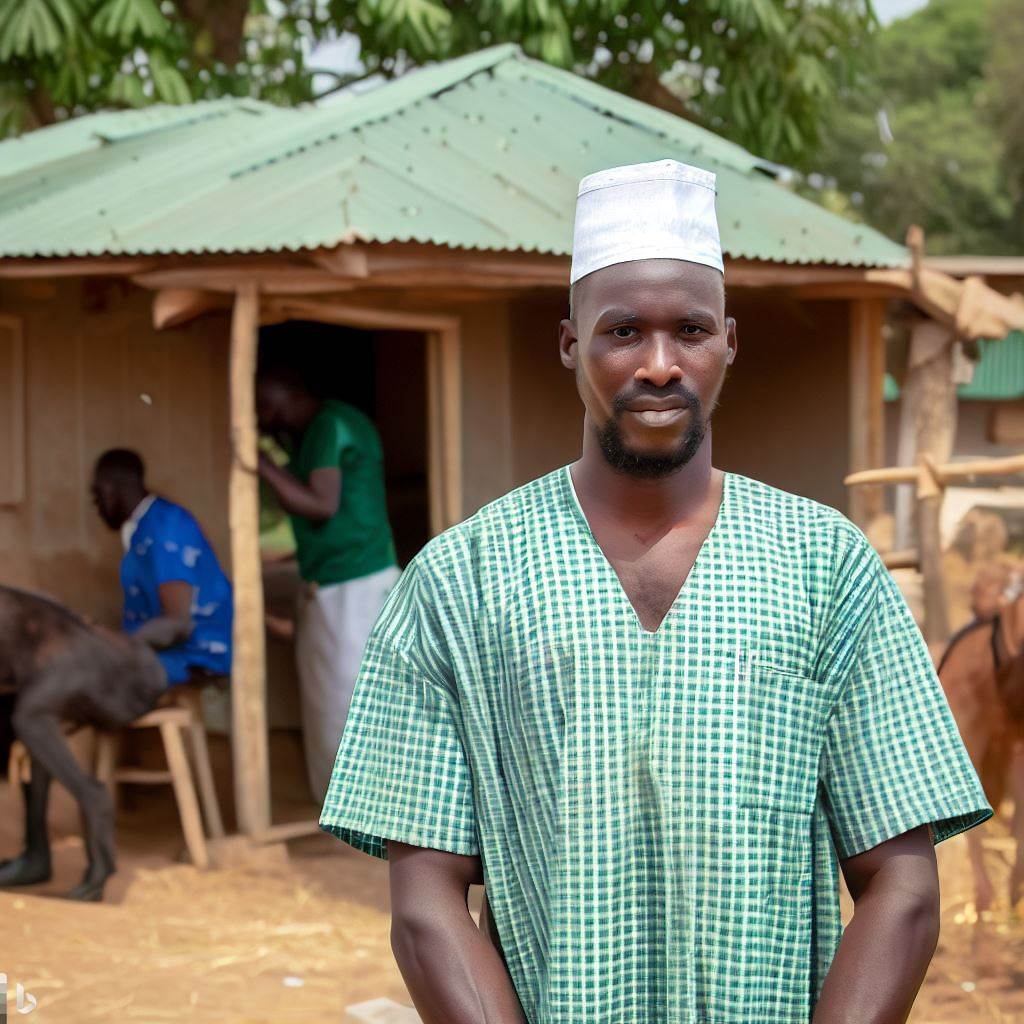Introduction
Exploring the Life of a Nigerian Marriage Family Therapist: Understanding the Impact of Culture on Relationships
The practice of marriage and family therapy involves a specialized form of psychotherapy centered around enhancing relationships.
Within the context of Nigeria, culture wields substantial influence over the dynamics of marriages and relationships.
This post is dedicated to delving into the intricate journey of a Nigerian Marriage Family Therapist.
Marriage and family therapy is a specialized form of psychotherapy that focuses on improving relationships within a family unit.
It is an active and collaborative process that aims to address and resolve conflicts, enhance communication, and promote overall well-being within the family.
In Nigerian culture, relationships and marriages are deeply rooted in traditions, customs, and societal expectations.
Family plays a central role, and marriages often involve extended family members and communities.
Traditional values, religious beliefs, and gender roles heavily influence marital dynamics and family dynamics.
The purpose of this blog post is to provide an insight into the day-to-day life of a Nigerian marriage and family therapist.
It will shed light on the unique challenges and rewards of working within the Nigerian cultural context.
By exploring the therapist’s experiences, readers will gain a deeper understanding of the role marriage and family therapy plays in Nigerian society.
Throughout this post, we will delve into the therapist’s interactions with clients, their approach to therapy, and the diverse issues they encounter.
From helping couples navigate cultural differences to addressing generational conflicts, the therapist’s role is vital in fostering healthier relationships and promoting emotional well-being within Nigerian families.
Join us on this journey as we explore the intricacies and complexities of a Nigerian marriage and family therapist’s life, and gain a deeper appreciation for the importance of relationship therapy within this cultural context.
Education and Training
Academic qualifications required to become a marriage and family therapist in Nigeria
To pursue a career as a marriage and family therapist in Nigeria, individuals must fulfill specific academic requirements. These qualifications include:
- A bachelor’s degree in psychology, counseling, social work, or a related field.
- A master’s degree in marriage and family therapy or a closely related discipline.
- Completion of required courses in marriage and family therapy theories and techniques.
- Participation in clinical practicum or internship programs to gain hands-on experience.
- Master’s thesis or research project demonstrating knowledge in the field.
Importance of specialized training in counseling and therapy techniques
Specialized training in counseling and therapy techniques is crucial for marriage and family therapists in Nigeria.
It provides them with the necessary skills and knowledge to effectively assist their clients. This training emphasizes:
- Evidence-based therapeutic approaches for couples and families.
- Cultural sensitivity and understanding of diverse family dynamics.
- Assessment and diagnosis of mental health issues within a family context.
- Development of effective communication and conflict resolution skills.
- Understanding of ethical guidelines and professional standards.
Licensing process and professional development requirements
In Nigeria, obtaining a license to practice as a marriage and family therapist involves a comprehensive process.
This process ensures that therapists meet the necessary standards of competence and ethical practice. The licensing process includes:
- Completion of the required education and training mentioned earlier.
- Accumulation of supervised clinical hours, typically around 1,000 hours.
- Passing the Marriage and Family Therapy Certification Examination.
Additionally, marriage and family therapists in Nigeria are encouraged to engage in ongoing professional development to stay updated with current research and therapy practices.
This may involve attending conferences, workshops, and continuing education courses.
Read: How to Navigate Counselor Certification in Nigeria
Typical Daily Routine
Start of the day: Morning preparations and reflection
As a Nigerian Marriage & Family Therapist, my typical day begins with morning preparations and reflection.
I wake up early to ensure that I am mentally and emotionally prepared to help my clients navigate their challenges.
I start by organizing my workspace and reviewing any notes or materials related to my clients’ sessions.
This helps me stay focused and ensures that I have all the necessary resources at hand.
Once I am ready, I take a few moments to reflect on my own mindset and emotions.
It’s important for me to be in a positive and empathetic state of mind before I begin working with clients.
Engaging with clients: Individual therapy sessions
One of the most important parts of my day is engaging with clients through individual therapy sessions.
Each session is a unique opportunity to offer support, guidance, and a safe space for personal exploration.
I actively listen to my clients’ concerns, allowing them to express their thoughts and emotions freely.
I use various therapeutic techniques and interventions to help them gain insight into their issues and develop coping strategies.
During these sessions, I encourage my clients to be actively involved in their own healing process.
Together, we work towards identifying goals and developing a plan to achieve them.
Working with couples: Techniques and approaches used
Another important aspect of my daily routine is working with couples.
In these therapy sessions, I focus on improving communication, resolving conflicts, and strengthening their relationships.
I use evidence-based approaches such as Emotionally Focused Therapy (EFT) and Cognitive-Behavioral Therapy (CBT) to address the specific needs of each couple.
These techniques help them understand each other’s perspectives, rebuild trust, and foster a healthier connection.
By actively engaging with couples and providing them with a safe and non-judgmental space, I aim to facilitate open discussions and guide them towards better relational dynamics.
Family therapy sessions: Addressing conflicts and improving communication
Family therapy sessions allow me to work with entire families, addressing conflicts and improving communication among all members.
These sessions are crucial for resolving family issues and strengthening relationships.
Throughout these sessions, I encourage active participation from each family member, allowing everyone to express their concerns and perspectives.
I help them identify patterns, understand emotions, and find constructive ways to resolve conflicts.
I also facilitate discussions on family values, roles, and expectations to create a more harmonious and supportive family environment.
Documenting progress and maintaining records
To ensure the effectiveness and continuity of therapy, I dedicate time to documenting the progress of my clients and maintaining accurate records.
After each session, I write detailed notes summarizing the key points discussed, interventions used, and progress made.
These notes help me track the client’s journey, evaluate their progress, and plan future sessions.
I also maintain confidential records, ensuring that all information is secure and in compliance with ethical guidelines and legal requirements.
By consistently documenting and maintaining records, I can provide a more personalized and tailored approach to each client’s needs.
Basically, a day in the life of a Nigerian Marriage & Family Therapist is filled with various responsibilities and interactions.
From morning preparations to engaging with clients through individual and couples therapy sessions, addressing family conflicts, and documenting progress, each task contributes to the overall goal of supporting individuals and families in their journey towards greater well-being and healthier relationships.
Read: Online Counseling in Nigeria: Prospects and Challenges
Challenges Faced
Dealing with cultural stigmas around seeking therapy
As a Nigerian marriage and family therapist, one of the major challenges I face is the cultural stigmas attached to seeking therapy.
In Nigeria, there is a general belief that therapy is only for those who are mentally ill or “crazy.”
Many individuals and families hesitate to seek help due to the fear of being judged or ostracized by their community.
Overcoming language barriers and cultural nuances while providing therapy
Another significant challenge I encounter is overcoming language barriers and cultural nuances while providing therapy.
Nigeria is a diverse country with over 250 indigenous languages. It is vital for me as a therapist to be able to communicate effectively and understand the cultural context of my clients.
Adapting my therapeutic approach to align with their language and cultural background is crucial for building rapport and trust.
Balancing multiple cases, scheduling, and maintaining self-care
One of the most demanding aspects of being a marriage and family therapist in Nigeria is the balancing act of handling multiple cases, scheduling appointments, and maintaining self-care.
The demand for therapy services is high, and the number of clients seeking help can be overwhelming at times.
It is crucial for me to prioritize and manage my time effectively to ensure that each client receives the attention they deserve.
Additionally, I need to take care of my own mental and emotional well-being to prevent burnout.
In general, as a Nigerian marriage and family therapist, I face various challenges in my daily practice.
Overcoming cultural stigmas, navigating language barriers, and maintaining a healthy work-life balance are all part of the complexities I encounter.
However, I am dedicated to breaking down barriers and providing effective therapy that meets the diverse needs of my clients.
Despite the challenges, the fulfillment I receive from helping individuals and families navigate their relationships makes it all worthwhile.
Read: The Economic Impact of Counseling in Nigeria

You Might Also Like: The Impact of Sonography on Nigeria’s Healthcare System
Rewards and Fulfillment
In my work as a Nigerian marriage and family therapist, witnessing positive changes within families and relationships is incredibly rewarding.
Playing a role in restoring harmony and strengthening bonds brings me a deep sense of fulfillment.
Witnessing positive changes within families and relationships
One of the most fulfilling aspects of being a marriage and family therapist is seeing families transform.
After working with couples and individuals, witnessing their growth and progress is truly heartwarming.
When clients are able to resolve conflicts, communicate effectively, and rebuild trust, it is a source of great joy.
Observing parents and children reconnect and deepen their understanding of one another is incredibly rewarding.
Seeing families evolve into healthier, happier units makes all the challenges of this profession worth it.
Playing a role in restoring harmony and strengthening bonds
As a marriage and family therapist, I have the privilege of playing a crucial role in restoring harmony within relationships.
By providing a safe and non-judgmental space, I help families reestablish connections and repair fractured bonds.
Assisting couples in rebuilding their emotional intimacy and fostering a sense of togetherness is incredibly fulfilling.
Supporting individuals in healing past traumas and developing healthier patterns of relating is deeply rewarding.
Witnessing families evolve from a place of conflict and pain to one of love and understanding is truly gratifying.
Importance of staying committed to the profession and its impact on society
Staying committed to the profession of marriage and family therapy is of utmost importance.
My work not only has a significant impact on individuals and families but also on society as a whole.
By helping couples and families heal, I contribute to building stronger communities and a healthier society.
Investing in the growth and well-being of families can have a ripple effect, positively influencing generations to come.
Clearly, the rewards and fulfillment gained from this profession are immeasurable and make it all worthwhile.
Continuing to dedicate myself to this field allows me to witness the transformative power of therapy every day.
Publish Your Professional Profile, Business or Brand
Showcase your expertise, gain trust, and boost visibility instantly on Professions.ng.
Publish NowOverall, being a Nigerian marriage and family therapist brings immense rewards and fulfillment.
From witnessing positive changes within families and relationships to playing a role in restoring harmony and strengthening bonds, every day is a testament to the impact therapy can have.
Staying committed to the profession ensures a positive influence on society, creating a better world one family at a time.
Read: Importance of Culturally Sensitive Counseling in Nigeria
Personal Reflections and Lessons Learned
Sharing personal experiences and growth as a therapist
- As a Nigerian marriage and family therapist, I have encountered diverse challenges and experiences.
- Working with couples and families has provided me with valuable insights into human relationships.
- Through my profession, I have developed a deeper understanding of the complexities within Nigerian marriages.
- Witnessing the transformation and growth of my clients has been immensely rewarding.
- Being a therapist has allowed me to witness both the struggles and successes of couples and families.
- Sharing my personal experiences and growth with clients has fostered a deeper connection and trust.
- My own journey as a therapist has taught me the importance of empathy and compassion.
- By opening up about my own vulnerabilities, I have created a safe space for clients to do the same.
- Reflecting on my experiences has helped me refine my therapeutic approach and become more effective.
- Learning from my clients and their unique narratives has been an invaluable source of inspiration.
Importance of self-awareness and emotional well-being in providing effective therapy
- Being self-aware and attuned to my own emotions is crucial for providing effective therapy.
- Maintaining my emotional well-being enables me to better support and guide my clients.
- Understanding my own biases and values helps me create a non-judgmental environment for clients.
- By practicing self-care and self-reflection, I ensure that I am present and focused during therapy sessions.
- Recognizing and managing my countertransference reactions enhances the therapeutic relationship.
- Cultivating empathy and compassion towards myself enables me to extend it to my clients.
- Being aware of my own limitations allows me to seek supervision and consultation when necessary.
- Prioritizing my own mental health empowers me to effectively address the mental health of my clients.
- Continuously evaluating and addressing my own emotional well-being helps prevent burnout in this demanding profession.
- Modeling emotional resilience and self-care serves as an inspiration for clients in their own journeys.
Continual learning and professional development opportunities
- As a Nigerian marriage and family therapist, I understand the importance of continual learning.
- Participating in workshops and conferences allows me to stay updated with the latest research and therapeutic techniques.
- Engaging in peer supervision and consultation enhances my clinical skills and knowledge.
- Networking with other therapists provides invaluable support and a platform for collaboration.
- Reading books and articles on various therapeutic modalities expands my repertoire as a therapist.
- Seeking further education and training in specialized areas allows me to serve a wider range of clients.
- Maintaining my licensure and staying informed about ethical guidelines ensures client welfare.
- Embracing cultural competence enables me to address the unique needs of my Nigerian clients.
- Continual learning reinforces my dedication to providing the highest quality of care to my clients.
- Professional development opportunities allow me to evolve and grow as a marriage and family therapist.
Essentially, my journey as a Nigerian marriage and family therapist has been filled with personal growth, the importance of self-awareness, and a commitment to continual learning.
Through sharing personal experiences, understanding emotions, and embracing professional development, I strive to provide effective therapy and positively impact the lives of couples and families in Nigeria.
Explore Further: Nigeria’s Health Sector: Role of Phlebotomists Explained
Conclusion
Recap of the day in the life of a Nigerian marriage and family therapist
Throughout the day, as a Nigerian marriage and family therapist, I engage in various activities.
My day begins by reviewing and preparing for my scheduled sessions.
After that, meet with my clients, both individuals and families, and provide them with therapy and support.
I listen to their concerns, explore their emotions, and help them develop coping strategies.
I provide a safe and confidential space for them to express their thoughts and feelings.
After each session, I document the progress and update their treatment plans.
Encouraging individuals and families to seek therapy and support
I strongly believe in the power of therapy and support in promoting positive mental health and well-being.
Through my work, I encourage individuals and families to seek therapy and support whenever they face challenges in their relationships, communication, or overall mental well-being.
I emphasize the importance of seeking help early on, as it can prevent negative outcomes and promote growth and resilience.
Possible future trends and advancements in the field
The field of marriage and family therapy is constantly evolving, and there are several potential future trends and advancements that can be anticipated.
One possibility is the incorporation of technology in therapy, such as online counseling platforms and virtual reality interventions.
Additionally, there may be an increased focus on cultural competence, recognizing and addressing the unique needs of diverse populations.
Research and evidence-based practices will continue to drive the field forward, leading to more effective interventions and improved outcomes for clients.




